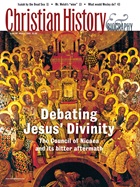In one of the quirks of church history, the "Nicene Creed" used in church hymnals and liturgies is a different creed from the one accepted at Nicaea.
In 381, the council of Constantinople affirmed the Nicene Creed and condemned heresies that had since arisen against Nicaea. But from later records (preserved at the Council of Chalcedon, 70 years later) we know that another creed was also used, now known as the Niceno—Constantinopolitan Creed. This creed is more strictly Trinitarian than the Nicene, describing each member of the Trinity in relation to the other members. The creed of 325 says less about the Father and only mentions the Holy Spirit with no description at all, since the council's attention was fixed on how the Son is no less divine than the Father.
The version below is the one used in the Western church; the Eastern version does not include the phrases in brackets. In particular, the statement that the Holy Spirit proceeds from the Father "and the Son" is still contested by the Eastern Orthodox Church as an unwarranted addition to Nicene theology.
D.H. Williams
The Original Nicene Creed
We believe in one God, the Father, almighty, maker of all things visible and invisible;
And in one Lord Jesus Christ, the son of God, begotten from the Father, only-begotten, that is, from the substance of the Father, God from God, light from light, true God from true God, begotten not made, of one substance from the Father, through Whom all things came into being, things in heaven and things on earth, who because of us men and because of our salvation came down and became incarnate, becoming man, suffered and rose again on the third day, ascended to the heavens, will come to judge the living and the dead;
And in the Holy Spirit.
But as for those who say, there was when he was not, and, before being born he was not, and he came into existence out of nothing, or who assert that the son of God is a different hypostasis or substance, or is subject to change or alteration ‐ these the Catholic and Apostolic Church anathematizes.
The Niceno-Constantinopolitan Creed
(The "Nicene Creed" used in worship)
I believe in one God, the Father Almighty, Maker of heaven and earth, and of all things visible and invisible.
And in one Lord Jesus Christ, the only-begotten Son of God, begotten of the Father before all worlds; [God of God], Light of Light, very God of very God; begotten, not made, being of one substance with the Father, by whom all things were made.
Who for us men for our salvation, came down from heaven, and was incarnate by the Holy Spirit of the virgin Mary, and was made man; and was crucified also for us under Pontius Pilate; He suffered and was buried; and the third day He rose again, according to the Scriptures; and ascended into heaven, and sits on the right hand of the Father; and He shall come again, with glory, to judge the living and the dead; whose kingdom shall have no end.
And I believe in the Holy Ghost, thee Lord and Giver of Life; who proceeds from the Father [and Son]; who with the Father and the Son together is worshipped and glorified; who spoke by the prophets.
And I believe one holy catholic and apostolic Church. I acknowledge one baptism for the remission of sins; and I look for the resurrection of the dead, and the life of the world to come. Amen.
Copyright © 2005 by the author or Christianity Today/Christian History magazine.
Click here for reprint information on Christian History.

Support Our Work
Subscribe to CT for less than $4.25/month




























